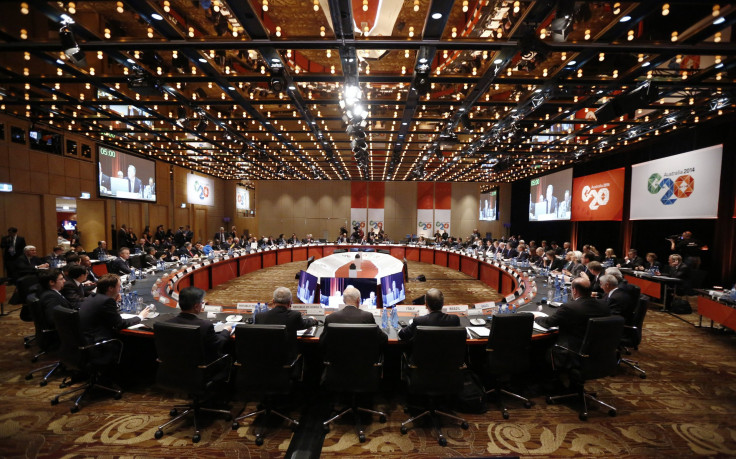G-20 Summit: $2 Trillion To Be Added As Additional Output Over Next 5 Years; GDP To Expand By 2%

At its just-concluded meeting in Sydney, the G-20 for the first time set a target number for global growth: more than $2 trillion in additional output in the following five years, in an effort to expand total GDP by 2 percent in that period.
The Group of 20, or G-20, member countries account for about 85 percent of the global economy, and the new target aims to increase investments into those economies and create millions of jobs. The meeting, which was conducted over the weekend, focused on topics such as single-bank coordination and structural reforms to kick-start growth.
"We will develop ambitious but realistic policies with the aim to lift our collective GDP by more than 2 percent above the trajectory implied by current policies over the coming five years," a G-20 statement said on Sunday.
The International Monetary Fund has forecast global growth to be at 3.75 percent this year and at 4 percent in 2015. And, if the decided target is achieved, it will boost global output by more than the world’s eighth-largest economy, Russia, produces in a year, according to Reuters.
"We are putting a number to it for the first time -- putting a real number to what we are trying to achieve. We want to add over $2 trillion more in economic activity and tens of millions of new jobs," Australian Treasurer Joe Hockey reportedly said. Similarly, U.S. Treasury Secretary Jack Lew said that “boosting growth and demand” topped the economic agenda at the meeting.
The main G-20 summit, which is scheduled for November, will see a detailed plan to achieve the goals agreed upon in Sydney, but there is widespread skepticism about a viable roadmap.
"Precisely how G-20 leaders plan to deliver on the Sydney promise to lift global GDP at least 2 percent by 2018 remains sketchy at best," Societe Generale's Michala Marcussen said, according to CNN.
Another topic discussed during the meeting was the necessity to implement stricter rules on cross-border taxation to prevent companies from shifting their income to low-tax countries. The focus was on companies such as Starbucks (NASDAQ:SBUX), Apple (NASDAQ:AAPL), Google (NASDAQ:GOOG) and Amazon (NASDAQ:AMZN). As the U.S. and Australia had recommended, the G-20 accepted that a set of common standards would apply for sharing bank-account information across borders, and G-20 members will begin to see an automatic exchange of information by the end of 2015.
Leaders of emerging markets, meanwhile, expressed concerns about the Federal Reserve's decision to gradually reduce buying bonds and its impact on their stock markets, which have suffered since the Fed's decision to begin tapering its asset-purchase program.
"We will continue to implement our fiscal strategies flexibly to take into account near-term economic conditions, so as to support economic growth and job creation, while putting debt as a share of GDP on a sustainable path. We will continue to work on improving these as part of our growth strategies," the G-20 summit statement said Sunday.
© Copyright IBTimes 2024. All rights reserved.






















